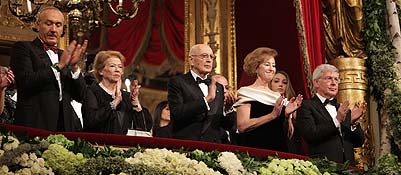
From Reuters:
La Scala’s production of Richard Wagner’s “The Walkyrie” drew a 15-minutes ovation on the opening night of the opera house season on Tuesday, though the climate of austerity sweeping Europe clouded the starry event.
With tickets costing as much as 2,400 euros ($3,200), the opening night at the 18th century opera house is one of the most popular cultural events on the calendar of the rich and influential.
German mezzo soprano Waltraud Meier, who played the passionate Sieglinde, won particularly loud applause.
From the Associated Press:
La Scala’s exacting audience — filled for the season premiere with leading political, cultural and business figures — showered Barenboim, the singers and director Guy Cassiers with 14 minutes of applause and bouquets of flowers after the performance.
Cassiers’ use of video, including the opening scene where Siegmund and Sieglinde discover each other, reportedly angered some of the singers who worried the character’s emotions were being overshadowed.
But Cassiers said after the performance that reports of discord were exaggerated. In fact, mezzo-soprano Waltraud Meier who sang the role of Sieglinde walked over during the curtain calls to bring Cassiers out on stage.
Cassiers said his goal is to bring all disciplines and technologies together on stage “to create a universe.”
“The most important thing for me on stage is not the set, is not the light, is not the visuals. It’s the singers. The singers are the guide … to stimulate you, to get you as close as possible to the material Wagner offers,” Cassiers said recently.
Lighting director Enrico Bagnoli, whose work often gave a sense of motion to the set, said he was surprised by how well the production was received.
“I always thought it wasn’t a very technological show. We used the media of today to tell a story. I am happy that the public understood. This is a group that didn’t want to create provocations. They wanted to do suggestive images to create a state of mind,” Bagnoli said.
“Die Walkuere” stars some of the most famous Wagnerian singers, including soprano Nina Stemme as Bruennhilde and mezzo-soprano Meier in the soprano role of Sieglinde — both of whom received shouts of appreciation. New Zealand-born tenor Simon O’Neill appears as Siegmund and Ukrainian bass Vitalij Kowaljow as Wotan, while Ekaterina Gubanova sings the role of Fricka and John Tomlinson is Hunding.
Before the final curtain call on December 7th — a few minutes after the conclusion of five ginormous hours of Wagner’s Die Walkure that opened La Scala’s new season on Milan’s holiday to celebrate the city’s patron saint, Sant’Ambrogio — the night was engraved as a triumph before the first strains of Wagner’s famous leitmotifs hit the adoring, vaguely taxidermied, Milanese public. Maestro Daniel Barenboim’s victory was sealed when he stepped from the orchestra pit onto the platea floor to inaugurate the evening and spoke out, in Italian, quoting the Italian Constitution (art 9.) to defend the future of culture in Italy, and deafening applause ensued (which was also directed to Palco Reale where Milan’s Mayor, Letizia Moratti kept company with Italy’s President, Giorgio Napolitano).
As Barenboim entered the orchestra pit at the beginning of Act II and Act III, preemptive cheering for La Scala’s “Maestro Scaligero” guaranteed the final triumph and today’s newspaper headlines, the Italian press creeming themselves in phrases like, “Il trionfo della Valchiria”, “Quattordici minuti di applausi”, “Scala, il trionfo di Barenboim” (massive headlines also addressed the out-of-control student protests which flared-up around Piazza della Scala/Palazzo Marino where the city’s most official post-opera Gala takes place.
Anger over Italy’s spending cuts, not only to cultural activities but also to higher education, spilled into the piazza, where students clashed with police swinging clubs. Smoke bombs and tear gas were lobbed during the clash and police reported 14 officers suffered minor injuries.
Hundreds of opera house workers from Genoa, Rome, Florence and elsewhere protested peacefully nearby as VIPs arrived for the social event of the Milanese season.
Inside, Barenboim, who has the unofficial title of principal guest conductor of La Scala, appealed to President Giorgio Napolitano, sitting in the royal box, to invoke protection of Italy’s cultural assets as called for in the country’s constitution:
“In the names of the colleagues who play, sing, dance and work, not only here but in all theatres, I am here to tell you we are deeply worried for the future of culture in the country and in Europe,” Barenboim told President Giorgio Napolitano, who was in La Scala’s royal box.
The theatre erupted in applause, with Napolitano joining in.
Barenboim urged Napolitano to heed the Italian constitution and quoted a portion that says the country promotes “the development of culture and scientific and technical research” and that the republic would safeguard Italy’s “historical and artistic heritage.”
After the evening’s performance, Barenboim told reporters he believed that the economic crisis has endangered arts and culture across all of Europe.
“Culture is not a luxury,” he said. “Human ethics are expressed truly in culture, in music, in opera, in theatre. It is ridiculous to think you can resolve economic problems by cutting culture.”
.
Related:
Further Reading:
- The Guardian: Italy Arts Cut Protests Reach Crescendo with Riots at Milan’s La Scala
- CBC News: La Scala Opener Sees Protests Inside and Out
- The Wall Street Journal: Italy’s Constitution and Operatic Arias
- National Public Radio: Barenboim Appeals To Protect Italian Culture
- Opera Chic: Review of Barenboim’s Baby: Die Walkure’s Premiere at La Scala’s La Prima
- Opera Chic: Video from Teatro alla Scala’s Wagner Die Walkure la prima (Plus a Blooper)!
.
1 thought on “Wagner’s “Die Walküre” at La Scala: The Reviews are In”